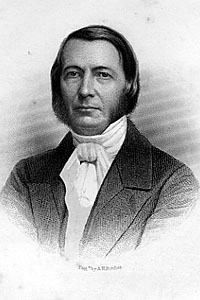
James Henley Thornwell
Encyclopedia

United States
The United States of America is a federal constitutional republic comprising fifty states and a federal district...
Presbyterian preacher
Preacher
Preacher is a term for someone who preaches sermons or gives homilies. A preacher is distinct from a theologian by focusing on the communication rather than the development of doctrine. Others see preaching and theology as being intertwined...
and religious writer.
Born in Marlboro District, South Carolina
South Carolina
South Carolina is a state in the Deep South of the United States that borders Georgia to the south, North Carolina to the north, and the Atlantic Ocean to the east. Originally part of the Province of Carolina, the Province of South Carolina was one of the 13 colonies that declared independence...
, on December 9, 1812; Thornwell graduated from South Carolina College
University of South Carolina
The University of South Carolina is a public, co-educational research university located in Columbia, South Carolina, United States, with 7 surrounding satellite campuses. Its historic campus covers over in downtown Columbia not far from the South Carolina State House...
at nineteen, studied briefly at Harvard, then entered the Presbyterian ministry. He became prominent in the Old School Presbyterian denomination in the south, preaching and writing on theological and social issues. He taught at South Carolina College, eventually served as its president, and went on to teach at Columbia Theological Seminary
Columbia Theological Seminary
Columbia Theological Seminary is one of the ten theological institutions affiliated with the Presbyterian Church . It is located in Decatur, Georgia. Dr. Stephen A. Hayner is the seminary's president.-Description:...
. He was a contemporary of Charles Hodge
Charles Hodge
Charles Hodge was the principal of Princeton Theological Seminary between 1851 and 1878. A Presbyterian theologian, he was a leading exponent of historical Calvinism in America during the 19th century. He was deeply rooted in the Scottish philosophy of Common Sense Realism...
and represented the southern branch of the Presbyterian church in debates on ecclesiology
Ecclesiology
Today, ecclesiology usually refers to the theological study of the Christian church. However when the word was coined in the late 1830s, it was defined as the science of the building and decoration of churches and it is still, though rarely, used in this sense.In its theological sense, ecclesiology...
with Hodge.
Thornwell founded the Southern Presbyterian Review, edited the Southern Quarterly Review, and had a prominent role in establishing the Presbyterian Church in the Confederate States of America. Thornwell preached the first sermon and wrote the first address for the new denomination. He died on August 1, 1862 after a long struggle with tuberculosis
Tuberculosis
Tuberculosis, MTB, or TB is a common, and in many cases lethal, infectious disease caused by various strains of mycobacteria, usually Mycobacterium tuberculosis. Tuberculosis usually attacks the lungs but can also affect other parts of the body...
.
Thornwell, in the words of Professor Eugene Genovese, attempted "to envision a Christian society that could reconcile-so far as possible in a world haunted by evil-the conflicting claims of a social order with social justice and both with the freedom and dignity of the individual."
Children of the covenant
Thornwell viewed mankind in three divisions:As a result the church was to treat children of the covenant
Covenant (biblical)
A biblical covenant is an agreement found in the Bible between God and His people in which God makes specific promises and demands. It is the customary word used to translate the Hebrew word berith. It it is used in the Tanakh 286 times . All Abrahamic religions consider the Biblical covenant...
"precisely as she treats all other impenitent and unbelieving men -- she is to exercise the power of the keys, and shut them out from the communion of the saints" (p. 341). As a result while children were still baptized
Baptism
In Christianity, baptism is for the majority the rite of admission , almost invariably with the use of water, into the Christian Church generally and also membership of a particular church tradition...
as heirs apparent, in his view they were "to be dealt with as the Church deals with all the enemies of God. She turns the key upon them and leaves them without" (p. 348).
This conclusion regarding children is described by L. B. Schenck (1940, "Children in the Covenant") as inconsistent with Presbyterian and Calvinistic thought to that point. The presumed regeneration
Regeneration (theology)
Regeneration, while sometimes perceived to be a step in the Ordo salutis , is generally understood in Christian theology to be the objective work of God in a believer's life. Spiritually, it means that God brings Christians to new life from a previous state of subjection to the decay of death...
of infants in the covenant, so characteristic of Calvinists since Dort
Synod of Dort
The Synod of Dort was a National Synod held in Dordrecht in 1618-1619, by the Dutch Reformed Church, to settle a divisive controversy initiated by the rise of Arminianism. The first meeting was on November 13, 1618, and the final meeting, the 154th, was on May 9, 1619...
, is not represented in this concept, but Thornwell's view may also be affected by the need to confront and reject the abuses of the Halfway Covenant.

